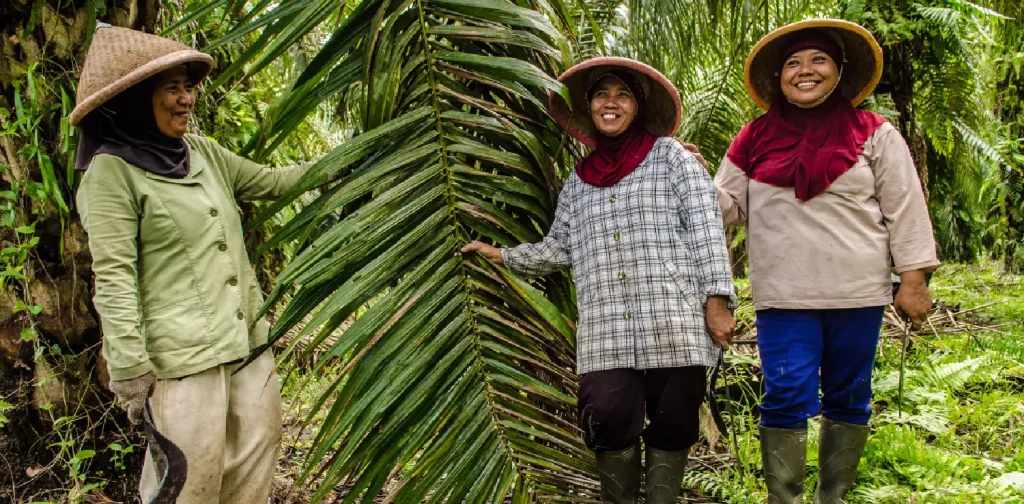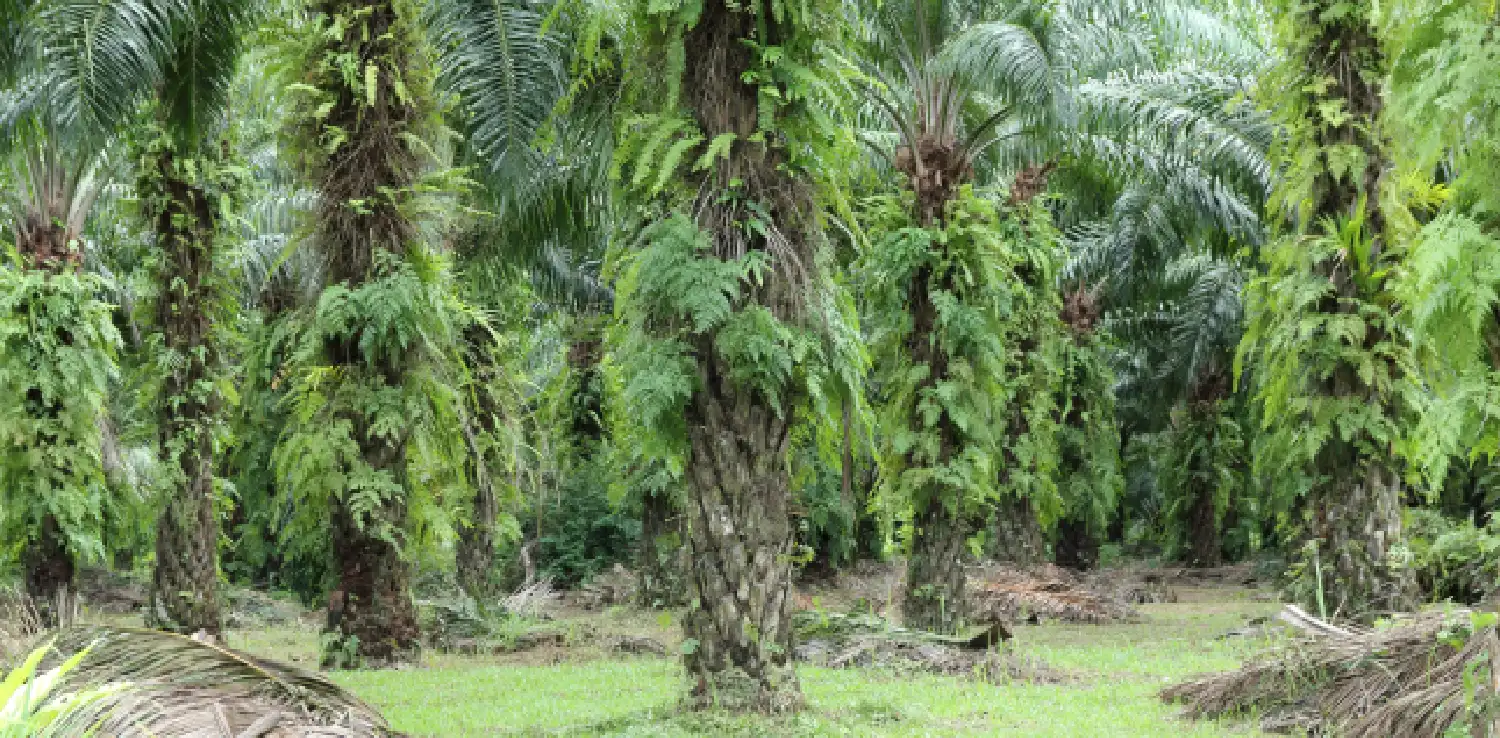Strengthening the Protection for Female Workers in Indonesia’s Palm Oil Industry

Female workers at the palm plantation. | Photo: UNDP.
Over the years, the palm oil industry has frequently faced criticism for its adverse environmental effects. The expansion of palm oil plantations, particularly those engaging in unsustainable practices, often resulted in issues such as deforestation, biodiversity depletion, soil degradation, and water pollution. Moreover, palm oil cultivation has far-reaching socio-economic repercussions, especially in the realm of employment. Among several prevailing challenges, the issue of gender inequality and the exploitation of female workers within the industry still become a pressing matter that demands immediate attention and resolution.
Indonesian Palm Oil Industry
Indonesia holds the title of the world’s largest palm oil producer, underscoring the crucial role palm oil plays in the country’s economic activities. The vegetable oil derived from palm oil is in high demand across diverse industrial sectors. Palm oil’s distinctive features, including its resistance to oxidation under high pressure, capacity to dissolve otherwise insoluble chemicals, and robust coating abilities, render it suitable for a wide range of functions. These include its use as cooking oil, industrial oil, and as a fuel source (biodiesel).
The Indonesian Ministry of Agriculture reported that in 2023, the total area of palm oil plantations reached 16.83 million hectares. Furthermore, the government intends to expand the area with the addition of 20 million hectares distributed across multiple islands. The Indonesian Central Agency of Statistics recorded that in 2022, the palm oil industry’s total production hit 46.82 million tons. Riau, Central Kalimantan, West Kalimantan, North Sumatra, and East Kalimantan emerge as the leading provinces in both plantation area and palm oil production. Trade wise, 60% of Indonesia’s palm oil production is exported globally, while the remaining share is catering to the domestic market.
In the sector of employment, the Indonesian palm oil industry engages at least 16.2 million workers whether directly or indirectly throughout the entire palm oil supply chain. Over fifty percent of these workers are day laborers without long-term contracts, and a significant portion of them are women.

Addressing Gender Inequality and the Exploitation of Female Workers in the Palm Oil Industry
Despite its economic significance, the palm oil industry is still plagued by issues of gender inequality and exploitation experienced by female workers. In a thematic discussion leading up to the Women’s Congress titled “Involvement of Women Around the Palm Plantations”, the Indonesian National Commission on Human Rights and the Ministry of Manpower noted several main issues commonly faced by female workers in the palm oil industry. Many of these issues have persisted for decades, even dating back to the Dutch colonial era. Some of the issues include:
- Female workers in palm oil plantations are frequently unacknowledged. Their employment status is often reduced to a mere assistant to their husbands. These women are commonly hired without formal employment contracts. The practice of enlisting family members for plantation management within a hetero-patriarchal framework plays a role in sustaining this subordinate position.
- The majority of female workers in palm oil plantations are casual laborers and often receive low wages or no payment at all as their earnings are combined with their husband’s wages.
- There is a lack of occupational health and safety protection for female workers.
- Limited provisions for menstrual and maternity leave.
- Lack of on-site facilities, such as childcare services, to support female workers during their work hours.
- Harassment and sexual violence as prevalent issues in palm oil plantations, leaving female workers vulnerable at any moment.
Furthermore, female workers in the palm oil industry grapple with the dual responsibility of unpaid caregiving duties and household tasks. The socio-economic impact of palm oil plantations may also lead to land conflicts. For instance, in the Musi Rawas Regency of South Sumatra, a female worker in a palm oil plantation shared how she lost her livelihood, which relied on natural resources.
“As a local, I feel deceived by the company’s persuasion. Previously, we had forests, coffee plantations, rubber plantations, rice fields, durian orchards, and so on. We lived a simple and sufficient life with the yields from our plantations. We were promised a better and more prosperous life, told that we would be employed by the company. However, once they came in, we were assigned to work in the plantations by a third party, instead of being employed by the company. Moreover, the wages are below the regional minimum wage along with high work targets,” said Siti Roani, a worker of the plantation.
Regrettably, Siti added, “The government’s responses to various issues faced by these female workers are still minimal.”
Involvement of Multiple Stakeholders is Essential
Nevertheless, various efforts have been made by the Indonesian government to support the protection of female workers and the promotion of equality in the palm oil industry. Some of these efforts include encouraging palm oil companies to provide for the needs of female workers, such as childcare facilities and fair wages. The government also aims to eliminate sexual violence in the workplace through the Indonesian Minister of Manpower’s Decree No. 88 of 2023.
Yet, relying solely on government initiatives is not enough. Enhancing protection for female workers in the palm oil industry demands the engagement of multiple stakeholders. This includes palm oil companies, labor organizations, civil society groups, human rights advocates, and the general public. It requires taking comprehensive, integrated, and sustainable actions. Some essential steps are:
- Strong regulations: The government needs to establish robust regulations to protect the rights of female workers in the palm oil industry, including aspects of wages, working hours, safe and healthy working conditions, and protection against discrimination and violence in the workplace.
- Economic empowerment: Programs that support women’s economic empowerment need to be implemented to ensure access to equal employment opportunities, skill and capacity development, and socio-economic mobility for female workers.
- Protection of health and safety: Companies must offer proper health and safety amenities at work and organize regular training sessions on occupational safety, including gender-based violence and harassment prevention measures.
- Access to education and training: Education and training programs are crucial for female workers to enhance their skills and improve their job mobility and career opportunities.
- Family welfare support: Companies and third-parties must provide adequate support for family welfare, including reasonable maternity leave, access to childcare, and flexibility in working hours.
- Independent monitoring and reporting: Independent monitoring mechanisms are necessary to ensure that companies comply with regulations and standards related to the rights of female workers. These mechanisms should also provide safe channels for workers to report abuse or violations of their rights.
In the end, the palm oil industry in Indonesia must be encouraged to become a truly sustainable and inclusive sector. This means managing things in a way that benefits everyone. This is crucial not only to ensure the wellbeing of communities and social harmony but also to support a reliable supply chain, consumer trust in the produced products, and the conservation of biodiversity and environmental protection.
The original version of this article is published in Indonesian at Green Network Asia – Indonesia.

Co-create positive impact for people and the planet.
Amidst today’s increasingly complex global challenges, equipping yourself, team, and communities with interdisciplinary and cross-sectoral insights on sustainability-related issues and sustainable development is no longer optional — it is a strategic necessity to stay ahead and stay relevant.


 Indian Gig Workers Push Back Against 10-Minute Delivery Service Strain
Indian Gig Workers Push Back Against 10-Minute Delivery Service Strain  Call for Governance: Grassroots Initiatives Look to Scale Efforts to Conserve Depleting Groundwater
Call for Governance: Grassroots Initiatives Look to Scale Efforts to Conserve Depleting Groundwater  Integrating Environment, Climate Change, and Sustainability Issues into Education Systems
Integrating Environment, Climate Change, and Sustainability Issues into Education Systems  Finally Enforced: Understanding the UN High Seas Treaty
Finally Enforced: Understanding the UN High Seas Treaty  Risks and Opportunities of Submarine Communication Cables for Sustainable Development
Risks and Opportunities of Submarine Communication Cables for Sustainable Development  Rising Attacks and Violence Against Land and Environmental Defenders
Rising Attacks and Violence Against Land and Environmental Defenders